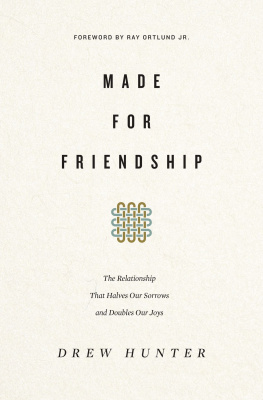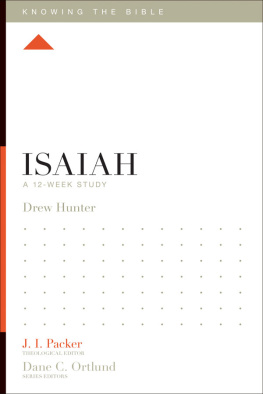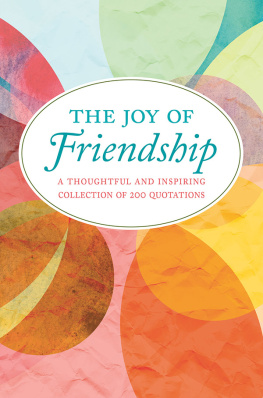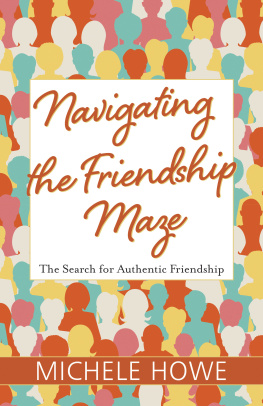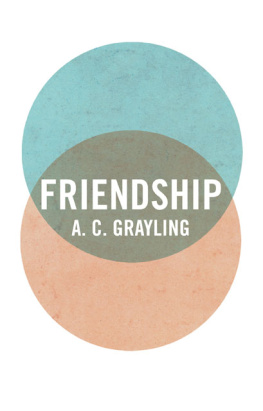Table of Contents
Landmarks
Aelred of Rievaulx. Spiritual Friendship . Translated by Lawrence C. Braceland . Collegeville, MN: Liturgical Press, 2010.
Aelred was a twelfth-century English monk. Although this is not an easy read, it is one of the few great books on Christian friendship from the past centuries. He affirms the inherent goodness of human friendship by rooting it in Gods gift of creation, and he shows how Christian friendship endures forever.
Black, Hugh. Friendship . Ontario, Canada: Joshua Press, 2008.
Black was a Scottish pastor and theologian. Writing at the end of the nineteenth century, even then he noted the thinness of the modern view and practice of friendship. He explains the marks and benefits of friendship but also adds insight on how to endure losing friendships through death or relational decay.
Edgar, Brian. God Is Friendship: A Theology of Spirituality, Community, and Society . Wilmore, KY: Seedbed Publishing, 2013.
This is a more academic work. Although Edgar does not give much attention to cultivating personal friendships, he shares insights on the topic from historical, theological, and philosophical perspectives. This is the most comprehensive book on friendship from a Christian perspective.
Goodwin, Thomas. Of Gospel Holiness in Heart and Life, 129336. Vol. 7 of The Works of Thomas Goodwin . Lafayette, IN: Sovereign Grace Publishers, 2001.
Goodwin was an English Puritan pastor and author from the 1600s. His unique gift to us today is his insight into the heart of God. In this stirring work on gospel - centered sanctification, Goodwin frames the whole of the Christian life in terms of friendship with God. This is the best resource available on the neglected topic of friendship with God.
Lewis, C. S. Friendship, 5790. In The Four Loves . New York: Harcourt and Brace, 1960.
This is an enjoyable and insightful read on the uniqueness of friendship. Lewis explores aspects of friendship that hardly anyone else does, and he explains insights into friendship in a way that only he could.
Roberts, Vaughan. True Friendship: Walking Shoulder to Shoulder . Leyland, England: 10Publishing, 2013.
Roberts has a gift of clearly presenting the essential elements of any topic he addresses. True Friendship is a concise and practical overview of the central marks of friendship from Proverbs. The best short and practically oriented read on the topic.
Ryle, J. C. The Best Friend, 31730. In Practical Religion . Carlisle, PA: Banner of Truth, 2013.
This sermon is a sustained exposition of Jesus as our best and greatest Friend. Ryle preached this to commend Jesus as the one true Friend that we all need and want. A delight to read.
Spurgeon, Charles. The Friends of Jesus . Vol. 26 of Spurgeons Sermons: 1880 . Grand Rapids, MI: Christian Classics Ethereal Library. http:// www .ccel .org /ccel /spurgeon /sermons .xli .html.
Spurgeon preached several sermons on the theme of Jesus as our truest Friend. This one, preached from John 15:14, draws attention to Christs heart of love for his friends and the great honor he gives us when he befriends us.
We have few friendships, because we are not willing to pay the price of friendship.... The secret of friendship is just the secret of all spiritual blessing. The way to get is to give.
Hugh Black
Heres a myth about friendship: it just happens. I used to believe that. I didnt think it required skill, effort, or careful work. But Ive learned that friendships good friendshipsrequire cultivation.
We can think of cultivating friendships like cultivating the ground. When my family and I moved to Indiana a few years ago, we found many people who planted gardens in their yards. So we tried it too. The first year we planted too much, too close together, and with too little understanding of how to maintain it. Since I neglected the cucumbers (which were my only responsibility), they sprawled out like a wild vine over the whole garden bed. We tried again the next year but made the garden one - third smaller. This time weeds took over and nearly choked everything else out. This past spring we considered filling it all in with grass. But we decided to try again. And its working out this time.
Why? Were learning to cultivate. Specifically, we now have wisdom, we put in the work, and we uproot weeds. Because we lacked these three things before, our garden turned into a wasteland and we almost gave up. But now we watch our kids happily gather up raspberries, tomatoes, and cucumbers.
Similarly, without cultivation, friendships either wither or become unruly. Sometimes we may even feel like giving up. If youre like me, the last chapter made you realize that youre not as good a friend as you thought. Or maybe youve enjoyed friendships, but you want to be a better friend. Where do we go from here? How do we cultivate better friendships?
True friendships take wisdom , they take work , and, in a fallen world, they take weeding . They are also worth every bit of the effort we put into them.
Practicing Wisdom
Wisdom is about living well in the world. We grow in wisdom as we see how God designed life to work, and then we adjust to fit with that design. God made different relationships to work in different ways. Marriage, parenting, and work relationships each require different approaches. Like these relationships, friendships flourish when we approach them with certain principles in mind. Lets consider four of them.
Give Your Friends a Promotion
When friendships fail, we can usually trace it back to imbalanced priorities. We rightly value things such as work, family, and rest. But if we let any or all of those fill our lives, we wont have any room left for friends.
One myth that keeps us from enjoying friendship is that were too busy for it. It may be true that you are too busy for friends. But that doesnt mean you should be. We always make time for what we treasure. Consider how much time you spend each week on personal entertainment such as watching sports and shows or clicking through social media. Could you trade some of those hours for time with a friend? Our lives may seem busy, but if we promote our friends in our priorities, we will find space for them in our schedules. This will often involve sacrifice. We will have to say no to other good things in order to say yes to our friends.
What do we do if we have to move away from friends? First, keep strengthening your longtime friendships. We dont need to end our relationships when we move away. We can stay in touch through calls and letters and messages, and we can plan to travel to meet up together.
Second, invest in forming new relationships where you live. We may not proactively make friends in a new area because we fear that we wont find any. Or we may resist making new friends because we arent certain how long well stay here. But consider what my friends Scott and Katie did. They were moving from California to Illinois for Scott to start graduate school. They cried on the way because they were leaving their closest friends. They would only be in Illinois for two years, but on that drive they made a decision: they committed to make sure that it would hurt just as much to move away from Illinois as it did to move to Illinois.
Third, maybe you dont have to move. But if friendship really is as great as Lewis and others say it is, then shouldnt it at least factor into the decision? Maybe we should sometimes turn down a bigger paycheck if it means we have to move away from the people who contribute so much joy to our lives and in whom weve invested so much time and effort.
Take a Dose of Realism
Heres another myth about friendship: we can have a lot of very close friends. If friendship takes time, and we only have so much of it, then we wont have enough to share with everyone. This shouldnt discourage us; it just means that good friends are like the best meals. A Thanksgiving spread looks great, but you can only fit so much on one plate.

